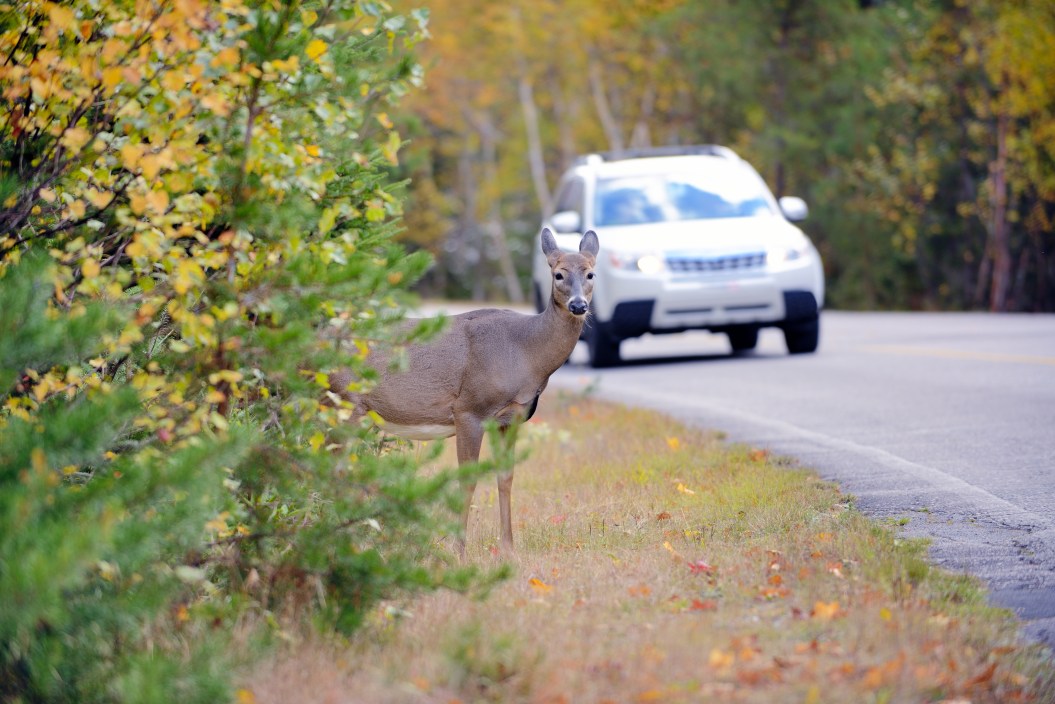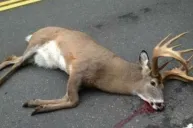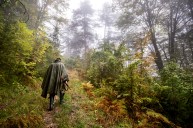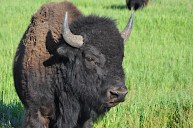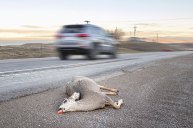An estimated 350 million vertebrate animals are killed by traffic in the US each year. A lot of these deaths are made up of squirrels and other small creatures, but quite a few are deer, moose, and other large game animals. Either way, most are big or small animals you can hunt and certainly that you can eat. But historically, after the animals have been killed, they are disposed of, either being left out for scavengers, donated to science, or thrown in landfills.
While a carcass being left for other wildlife or used for science is good use of a dead animal, being thrown in a landfill is a waste of what is oftentimes good meat. Hunters have always appreciated the bounty of wild game meat they receive from a successful hunt. A revival in the salvage of roadkill game meat for human consumption is encouraging others to enjoy the same.
While some states have allowed for the harvest of roadkill for decades (Marlinton, Virginia, has hosted a Roadkill Cook-Off for the past 35 years), more and more legislation has been passed in the last decade, in particular, to allow for the collection and salvaging of roadkill game meat.
In July 2016, Washington passed legislation allowing the salvage of elk and deer, while in January 2019, Oregon also allowed the practice and had 167 salvage permits applied for in the first three months. In 2022, California started a pilot program for salvaging roadkill with its "Kill It and Grill It" law, bringing the number of states where it's legal to harvest roadkill to over 30.
While roadkill may not sound like the most appetizing meat at first, if legally and safely acquired, it can be a great way to fill your freezers with minimal effort.
Roadkill Health and Safety Basics
- Before tossing any old roadkill in your vehicle, you'll want to examine it first. Most importantly, you want to make sure that the victim is actually dead. Any injured animals should be immediately reported to wildlife officials, in case they can be rehabilitated or humanely euthanized. Definitely don't use your car to purposefully kill an animal. Not only is it illegal and extremely unethical, but it can also be very dangerous.
- Once you've ascertained that the animal is dead, make sure it hasn't been dead for a long time. Any flies or maggots in the carcass, sickly-sweet smells, or bloating means the meat has already gone bad. Also, make sure the carcass wasn't badly crushed (this will lead to bone fragments in much of the meat), or had its stomach or intestines ruptured.
- If the carcass is in good shape, and your state allows for it, go ahead and harvest the meat. We recommend bringing the carcass home, or at least dragging it into the woods, so as not to horrify passers-by.
- As always, make sure to cook the meat thoroughly, and enjoy your harvest. If you're looking for recipes for your roadkill, check out Wide Open Space's wild game recipes.
State by State Run Down
States differ regarding what animals are legal to claim and what seasons you can claim them in. Some require permits, or that you report any game meat you've collected. Alaska considers roadkill state property and has its own system of distribution. We've included a run-down of each state in this article, but make sure to double-check local laws before throwing a road-killed deer in the back of your truck.
- Alabama: Only non-protected animals and game animals during open season may be salvaged.
- Alaska: Individuals are not allowed to salvage animals, but animals may be distributed through volunteer organizations. Individuals can also sign up for a roadkill salvage program for moose.
- Arizona: Permit required, and only big game animals may be salvaged.
- Arkansas: Unprotected animals can be salvaged under a hunting tag. Salvage must be reported to the Game and Fish Commission.
- California: Legal in some areas under a "wildlife salvage permit" under a pilot program.
- Colorado: Deer, elk, and antelope can be kept, but Parks & Wildlife must be notified. All other species may be kept under specific circumstances, to be determined by Parks & Wildlife.
- Connecticut: Deer, moose, and bear can be kept as long as it is reported to police.
- Delaware: Deer can be kept with a tag. If a driver doesn't want it, the animal must be donated to a public or charitable institution.
- Florida: Deer, fox, raccoon, opossum, and squirrel can be kept in season. Out-of-season salvage requires notification of Fish and Wildlife Conservation Commission.
- Georgia: Native species may be salvaged. You must notify the state of road-killed black bears.
- Hawaii: No information found.
- Idaho: Legal, but you must report the salvaged roadkill within 24 hours to the Department of Fish and Game.
- Illinois: Furbearers can be kept, but a hunting or trapping license and/or habitat stamp is required,
- Indiana: Permit required.
- Iowa: Deer can be taken with a salvage tag.
- Kansas: Game animals and furbearers can be possessed in season with proper licenses. Big game and turkeys can be possessed out of season with a salvage tag.
- Kentucky: Reporting the type of animal and location is required.
- Louisiana: Illegal.
- Maine: Legal, transportation permit needed for big game animals.
- Maryland: Permit required.
- Massachusetts: Permit required. You must submit the roadkill for state inspection.
- Michigan: Salvage permit required.
- Minnesota: Permit required.
- Mississippi: No information found.
- Missouri: A Wildlife Dispensation Permit from the Missouri Department of Conservation is required.
- Montana: Salvage tag required
- Nebraska: Legal, with salvage tag.
- Nevada: No specific laws, but roadkill is considered state property and salvagers could face poaching charges.
- New Hampshire: Legal, first offered to the driver.
- New Jersey: Permit is required and only deer may be salvaged.
- New Mexico: Permission from local conservation officer required.
- New York: License or tag may be required, depending on the species.
- North Carolina: Legal, but must register the animal over the phone with the Department of Natural Resources.
- North Dakota: Permit is required, the process is different for different species.
- Ohio: Offered to driver first, accident must be reported to wildlife officer within 24 hours.
- Oklahoma: Legal, but local game warden must provide a receipt of possession first.
- Oregon: Legal for deer and elk, a permit is required.
- Pennsylvania: Reporting to the State Game Commission within 24 hours is required.
- Rhode Island: No information.
- South Carolina: No information.
- South Dakota: Proper notification and authorization are required to pic up deer or elk. Other species are illegal.
- Tennessee: Legal if law enforcement or wildlife resources agency is notified within 48 hours.
- Texas: Illegal.
- Utah: Permit for protected species such as deer and elk is required.
- Vermont: Possession tag for big game and furbearers is required.
- Virginia: Legal for the driver to salvage a deer if it reported to law enforcement and inspected. Salvage permits also available.
- Washington: Deer and elk may be salvaged, depending on the county. Permit required.
- West Virginia: Reporting within 12 hours of a salvage is required.
- Wisconsin: Legal, but must register the animal over the phone with the Department of Natural Resources.
- Wyoming: Approval is required from Fish and Game prior to collection.
READ MORE: Where Killing Snakes Is Legal (And Illegal) in All 50 States
